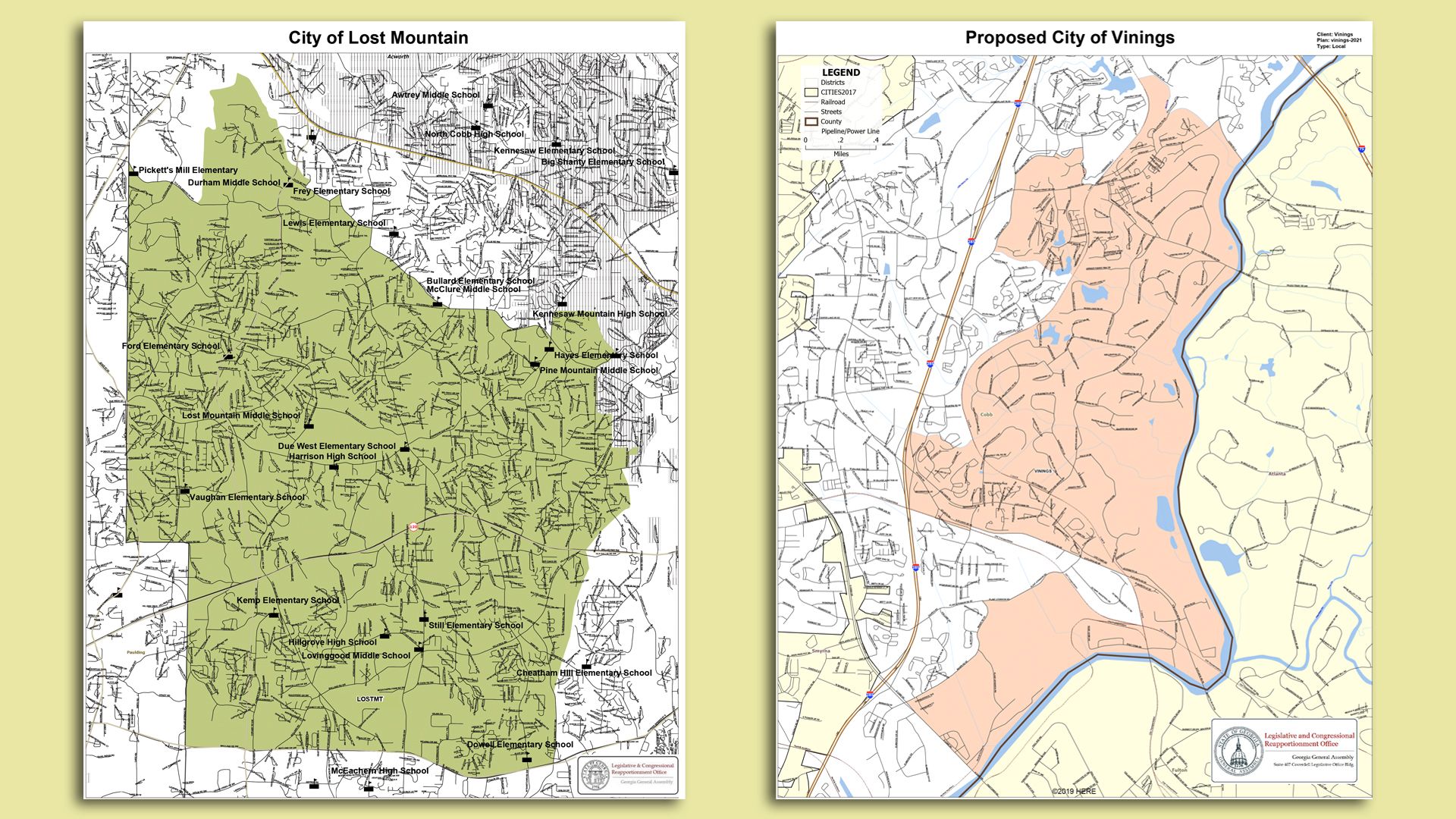Cityhood movement gains traction in Cobb
Add Axios as your preferred source to
see more of our stories on Google.

Maps courtesy of Vinings Exploratory Committee and Preserve West Cobb Citzens Alliance
Three unincorporated areas in Cobb County want to follow the lead of their Fulton and DeKalb counterparts to create their own cities, but one expert says that committee-driven cityhood proposals want to provide government services “on the cheap.”
Driving the news: Feasibility studies have been released for two unincorporated areas in Cobb, Lost Mountain and Vinings. The studies, performed by The University of Georgia Carl Vinson Institute of Government, show both areas would have a budget surplus after accounting for expenditures and revenues.
- An updated feasibility study for the proposed city of East Cobb is set to be released next week, East Cobb News reports.
- Vinings’ study suggests its annual expenses would be around $1.88 million while projected revenues would be around $3.09 million.
- For Lost Mountain, expenses are projected to be around $9.1 million, while revenues would hover around $12.53 million, its study suggests.
State of play: The proposed cities would each offer planning and zoning, parks and recreation and code enforcement/sanitation services to citizens. Georgia law requires cities to provide at least three services to incorporate or maintain their charters.
- Proponents say cityhood will allow them to control future land use, zoning and code enforcement issues within their boundaries.
By the numbers: Vinings would have a population of about 7,061 residents, and 74,619 would live in Lost Mountain, their studies show. The East Cobb Cityhood committee says its population would be around 55,000 residents.
In March, legislation that would allow residents to vote on incorporation were introduced for East Cobb, Lost Mountain and Vinings. Similar legislation was also introduced for Mableton, the south Cobb community where some residents have pushed for incorporation for several years.
What they’re saying: Tom Ham, treasurer of the Vinings Exploratory Committee, told Axios that committee members and residents in favor of becoming a city want to push back against developers who want to build large apartment complexes in their "sleepy suburb."
- While some refer to this bare-bones structure as “city lite,” Ham said Vinings’ plan to start small and keep things simple is attractive to people who are “tired of government doing runaway spending.”
The other side: Michael Leo Owens, an associate professor of political science at Emory University, told Axios that he doesn’t read too much into the Carl Vinson Institute’s studies because it uses “boilerplate” information to compare proposed cities to municipalities of a similar size.
He also said Vinings and Lost Mountain “don’t intend to be real, full-blown cities” since they won’t take on the big-ticket items: police, fire and emergency services. Both Vinings and Lost Mountain said they want to leave those services in the hands of Cobb County police and fire departments.
- “They really don’t want to do anything that costs the big bucks,” he said. “It’s city government on the cheap.”
State Rep. Ginny Ehrhart, who represents west Cobb and sponsored the Lost Mountain cityhood bill, told Axios that the point behind the push for incorporation is to bring planning and zoning issues closer to residents affected by decisions made at the county level.
- “They should be made by people who live here and not by people on the opposite side of the county,” she said. “It’s west Cobb citizens that need to be making those decisions themselves.”
Context: Incorporation around metro Atlanta took off in 2005 when Sandy Springs gained cityhood. It was quickly followed by Johns Creek, Milton, Chattahoochee Hills, Peachtree Corners, Dunwoody, Brookhaven, City of South Fulton, Tucker and Stonecrest.
- Most of the cities that have incorporated since 2005 have been mostly white, affluent areas, according to The Atlanta Journal-Constitution.
- Cities that incorporated in the mid-2000s, such as Sandy Springs and Johns Creek, took over police and fire services from Fulton County, but privatized services like community development, parks and recreation and public works.
